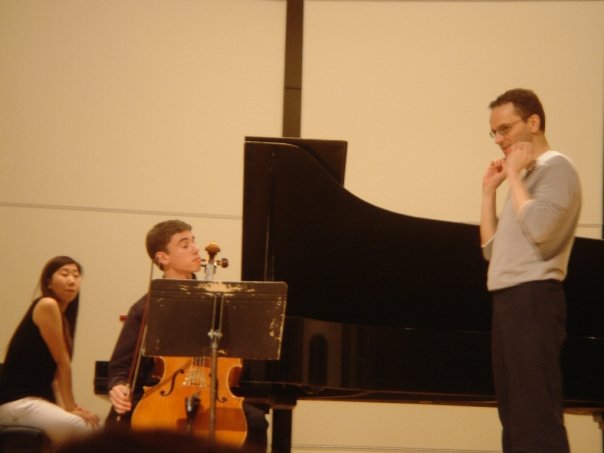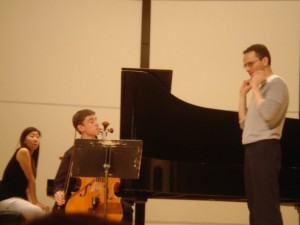Do Masterclasses Belong in Our Bios?
We at the Eastman School of Music have enjoyed a parade of celebrities this past month. First we hosted Chris Martin, the principal trumpet of the Chicago Symphony, who came with the Gaudette Brass; next, famed cellist Steven Isserlis stopped by in between concerto engagements; then, the legendary pianist Leon Fleisher came to town for an appearance with the Ying Quartet; and to top it all off, Itzhak Perlman performed the Bruch Concerto with the Eastman Philharmonia for a packed Kodak Hall. With the exception of Perlman, each of these amazing guest artists conducted a masterclass, and each one proved to be extraordinary. Of course, for those lucky students selected to perform, the classes proved to be rather nerve-wracking as well (“Oh, yes, you’re just performing for one of the most revered pianists of recent times, who taught at Curtis and stuff. No pressure.”). But even if a masterclass performance didn’t quite go as planned, there was a guaranteed reward for simply enduring it: a resume boost.
You don’t have to read much of a typical bio to come across the masterclass section. It usually crops up soon after a performer’s initial credentials, and is often quite lengthy, sometimes going as far as to include chamber music masterclasses as well. I am not an exception to this practice; if you navigate to the end of my Polyphonic blurb’s first paragraph, you will learn of all the luminaries I played for in various states of nervousness. My personal honor roll does include some reputable names–Ralph Kirshbaum and Gary Hoffman, for instance–and I certainly appreciated the opportunities I had to play for them. Yet, the more bios I read and the more I begin to consider the function of my own, I find myself doubting whether masterclass credentials really warrant an inclusion. Here are a few reasons why:
1) There is no real difference between a masterclass and a private lesson.
With a few exceptions, most teachers conduct masterclasses by hearing a run-through of a student’s piece and then essentially giving them a lesson onstage. So what is the difference, in terms of the information and feedback received, between that experience and a private lesson? The only one I can think of is if the teacher addresses issues directly related to performance, but these discussions are generally concerned with overcoming nerves, and most teachers are sympathetic enough to a student’s plight not to bring that up (and cause additional anxiety and awkwardness). Even if such a discussion arises, musical and technical issues are addressed eventually, so ultimately it really is just like a (rather short) private lesson. We don’t list the teachers we’ve had trial lessons with in our bios, so why should we list those we’ve played for in a masterclass?
2) Masterclass lessons rarely alter one’s technical approach to the instrument.
Unless the teacher somehow manages to make something click with a student who’s been struggling with a specific issue–and I’m sure it’s happened–the odds are very slim that one will emerge from a masterclass with a noticeably higher playing level. When we change our technique, it takes a long time for things to sink in–and while a different perspective can definitely be beneficial, it’s not going to become a lasting influence. In the masterclass I played for Gary Hoffman, he spent most of the time attempting to show me a new bow technique, which involved (among other strategies) him literally grabbing my bow arm and forcing it to move in the proper manner. I also remember that he remarked upon my lack of muscular stamina and advised me to swim more (“We’re in Boston–you’ve got the Charles River.”). I tried my best to do what he was advocating onstage, but I didn’t quite get the hang of it, and I certainly wasn’t going to start swimming in the Charles River–so in retrospect, I don’t think I really gained anything significant from that class. It was helpful at the time, but it in no way had a long-term impact on my playing. Yet, I still have his name in my resume….just because he’s famous, and well, I played for him.
Furthermore, a lot of masterclass teachers don’t even touch technique, or simply offer a few basic suggestions that the audience can benefit from, primarily because of the issues I outlined above. A lot of masterclasses just consist of teachers offering different ideas of musical interpretation, and while those are extremely helpful and ultimately transferable to other pieces, it’s not as if a student’s entire process of musical perception is changed as a result. The truth is that ten years down the road, nothing you worked on in a masterclass with someone will have made a significant difference in your playing. Don’t misunderstand me–masterclasses are of course deeply invaluable and meaningful experiences, both for audiences and performers alike–but logically speaking, how could twenty to thirty minutes working with a person dramatically alter your approach to your instrument, as if you had studied with that same person long-term? If we include the names of our masterclass teachers right up there with those of our private teachers, it gives the impression that we gained the same amount from them as we did from those professors we spent years with. An average audience member reading a bio will pay attention to the names he sees, but not necessarily the context in which those names appear–so “studied with Ralph Kirshbaum” and “performed in a solo masterclass for Ralph Kirshbaum” take on a similar meaning despite their obvious difference.
3) Just because you were selected for a prestigious masterclass doesn’t mean that you’re an exceptionally high-level player.
Some people argue that impressive masterclass experience implies a high level of ability, because you wouldn’t be asked to play for whichever genius is coming to town unless you possess some decent chops. While this is true in some cases, the reality is that selection for masterclasses is not always determined by a player’s talent. One summer festival I attended was specifically masterclass-oriented and afforded everyone an opportunity to play for whichever of the visiting “cello gods” they wanted–even though there was a wide variety in levels amongst the players. It was at this festival that I had the opportunity to play for Ralph Kirshbaum; he had visited NEC more than once when I was an undergrad, but I didn’t get a chance to play for him there simply because there were quite a lot of other able cellists at NEC, and I had already played for Gary Hoffman when he’d come the previous year. My point is that sometimes it is a lot easier for us to have masterclass opportunities that others haven’t–even if their level of ability is higher. And many times, it’s just luck of the draw. Some years, there aren’t a lot of guest artists that come to town; a student might not have had something ready in time for a class; there could be politics involved–the variables are endless. Some of the time it is true that you are selected to perform in a class because of your demonstrated talent, but I would wager that 60% of the time it’s a matter of luck and circumstance.
So, all things considered, it seems that there aren’t many compelling reasons for including masterclasses in our bios. Given the variable nature of such situations, it’s impossible to discern exactly how the experience of playing in a class impacted an individual’s musicianship, which might ultimately lead to a false perception by a third party. You might write that you played in a masterclass for Kim Kashkashian, but if you played badly and spent the whole time figuring out alternative fingerings for the Hoffmeister, is that really an experience that merits an inclusion in your biography? I certainly wouldn’t think so. Besides, intrinsically speaking, a bio should not be a laundry list of accomplishments so much as a representation of one’s artistic identity, and which individuals and experiences shaped that identity. If you once played for a famous person and talked about interpretation for twenty minutes, is that really an identity-shaping experience? And ultimately, when you think about it, a lot of audience members aren’t going to know Kim Kashkashian from Kim Kardashian; they’re just going to be interested in the music you’re playing for them right then, in the present moment. What you’ve done is never as important as what you’re doing.
I could end on that nice profound note, but I won’t, because I will obviously be perceived as hypocritical if I leave the impression that I am against including masterclass credentials in bios but still keep them in my own. So, I want to know what you think. Are masterclasses significant enough experiences to be included in your bio? Or do they really just become an excuse for name-dropping (with all good intentions, of course)? Comment below to contribute to the discussion.


